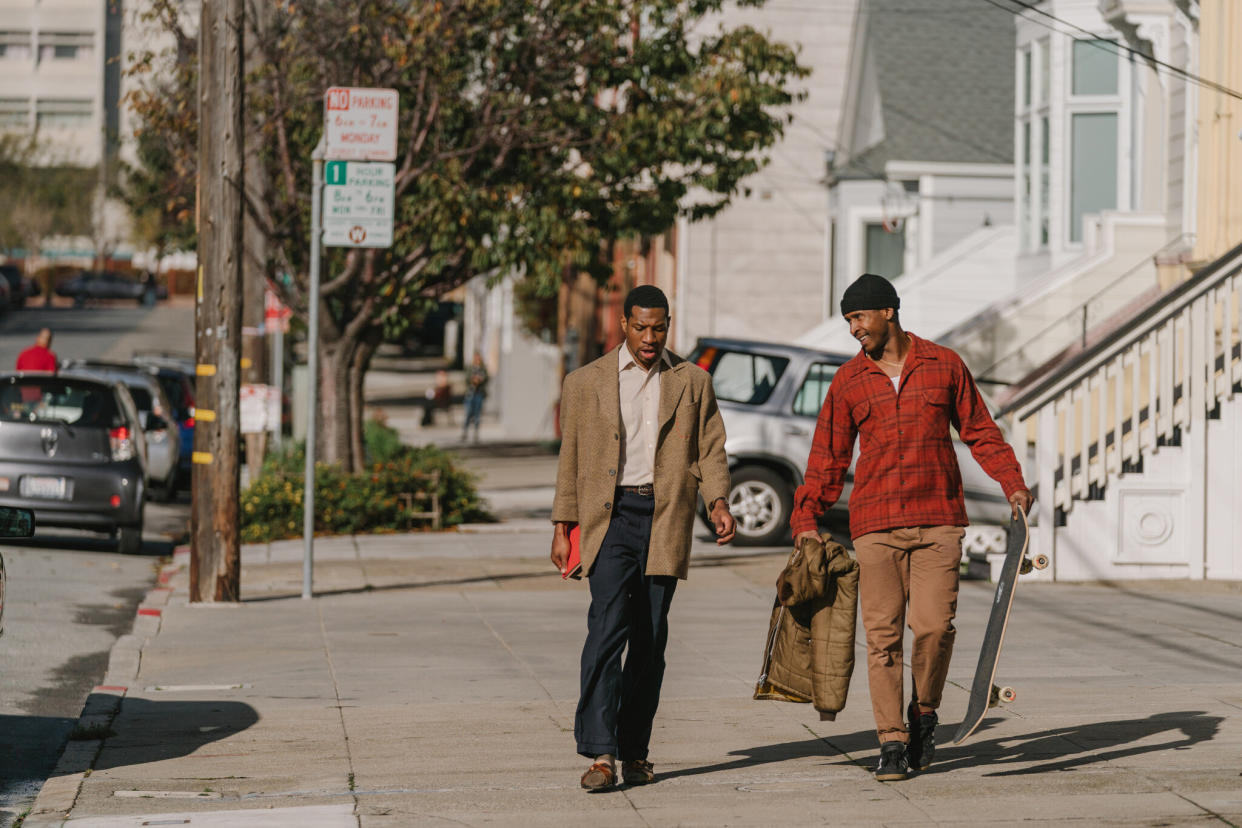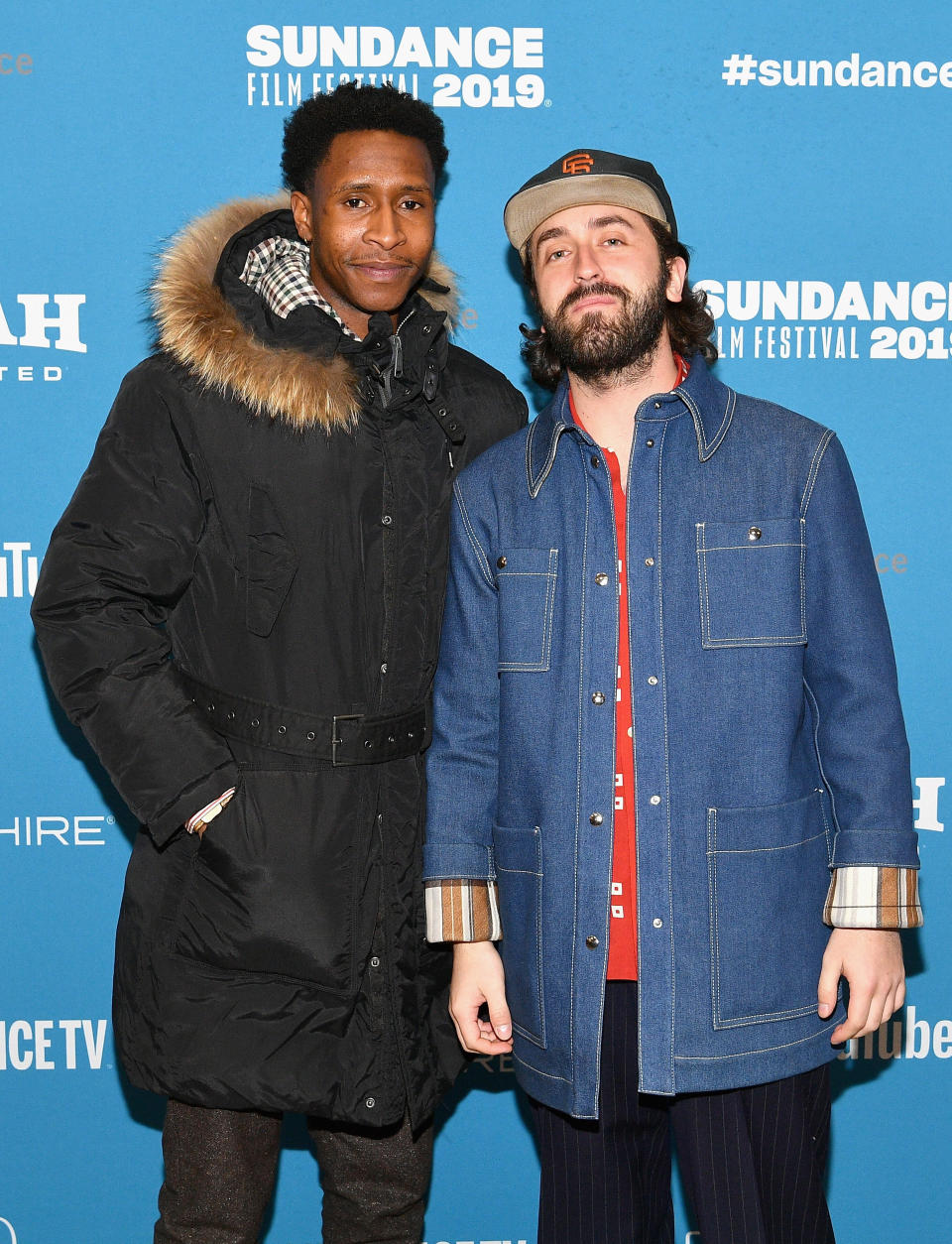How childhood friends from San Francisco became indie film champs with 'Last Black Man,' both a deep love letter to and stinging critique of their hometown

It was in the near-recent past, and early-twentysomethings Joe Talbot and Jimmie Fails were living with Joe's parents — both journalists-turned-authors — in their San Francisco home. It just so happened that they were making a movie executive produced by Brad Pitt at the same time.
Tell that to the neighbors.
"I was taking out the trash, and my neighbor was walking by, and she said, 'How's your little movie going?'" Talbot recounted to Yahoo Entertainment alongside his longtime friend and collaborator Fails during a recent sitdown at a West Hollywood hotel bar. "And my mom goes, 'Well, you know, Brad Pitt is producing the movie.' And they're like, '[Skeptically] Oh, sure, nice, that's awesome.' It was sort of unfathomable — understandably — to people, our neighbors and everybody else."
"We'd always get those 'little movie' comments," Fails explained. "Like, 'Oh, you guys are doing another little movie. Oh, sure. How's that going?'"
Added Talbot: "But that's the reality. To think that [Pitt] could be your executive producer, and you're working with these great people, but San Francisco is just so expensive, you're still living in your parents' house. It's sort of, in a nutshell, what the city is."
The resulting film, The Last Black Man in San Francisco — produced by Pitt's Plan B Entertainment (12 Years a Slave, Selma, Vice) and distributed by Cool Kids indie studio A24 Films (Spring Breakers, Lady Bird) — quietly emerged as one of the most revered premieres at January's Sundance Film Festival (where it scooped up two jury awards), and as it hits select cities this weekend, stands as one of the best reviewed movies of the year. Captivatingly directed by Talbot and starring Fails, it's based on a story conceived by the both of them. It's a stirring drama about two young black San Franciscans (Fails and Jonathan Majors, both in beautifully understated performances) grappling with a city in transition and their places in it, particularly when it comes to the grand Victorian home Jimmie's family lost when he was a youth, yet which he still takes painstaking care of (to the chagrin of the middle-aged white couple living there) because his grandfather built it.
Like two other recent buzzworthy Bay Area products Blindspotting and Sorry to Bother You, it's a film that takes the region to task for the gentrification sucking the soul out of it, not to mention the racial inequality and injustices that rear their heads as symptoms. Yet at the same time, it proves an unbridled love letter to San Fran, its people and its culture.
It's also a gem of a film so pure and moving and poetical and unique, it will no doubt put the childhood friends in position to do what they always dreamed: Make films in this business for a long time.

But let's go back to the beginning.
Talbot and Fails can't pinpoint the exact moment they met, but they were both preteens who hung out at Precita Park in the city's Bernal Heights area, where they would cross paths and "kind of acknowledge each other silently," Talbot recalled. Fails's family had lost their Fillmore District home years earlier (thus the autobiographical impetus for Last Black Man) due to a toxic combination of parental drug use and a sinking economy, and after that "moving all around... I lived in [almost] every housing project in the city."
Eventually Talbot invited Fails — who was living in a group home and supported through high school by a local social program — to his middle-class home. "I met up with him at his house and we had a heart-to-heart, talking all night," Fails said. "And that became part of our dynamic," Talbot explained. "Having these conversations, being able to be vulnerable with each other."
They bonded over hyphy music (the bouncy, uptempo hip-hop style that emerged from the Bay in the early aughts) and films like Do the Right Thing, Ghost World and After Hours — all future influences on Last Black Man.
"I feel like Joe came out of the womb with a camera in his hand, honestly," Fails joked. Creating their own art, then, became inevitable. They made films throughout high school, from which Talbot eventually dropped out. Fails graduated and attended one year of college.
In 2014, they created a "concept trailer" for Last Black Man, an idea spurred from one of their many heart-to-hearts. "At the end of it, it said 'Feature film coming 2015,'" Talbot remembered. "'Cause we were like, 'Oh yeah we'll just get the money and we'll make it.'" They raised $78,000 via a Kickstarter campaign (on a goal of 50K), a nice haul no doubt but ultimately not nearly enough to finance the type of film they wanted to produce.
Around the same time Talbot reached out to one of the only people he knew making films in the Bay, a man by the name of Barry Jenkins, whose 2008 indie darling Medicine for Melancholy also confronted gentrification in San Francisco. "I would see Barry Jenkins around the Mission. And I had seen Medicine for Melancholy. So I wrote him and he was really nice," Talbot said.
They soon met up, and Jenkins provided vital insights (if maybe a bit obvious) right off the bat: "The first thing he insisted on when I met with him, I was like, 'Do you really think I need a script? And he's like, Yes. You need to write a script.' And I was like, Are you sure? 'Cause all we ever did was improv in our movies we did in high school… So in the simplest way, thank God for Barry." (While Talbot and Fails share story credit, Talbot ultimately co-wrote the script with Rob Richert.)
And then Jenkins left town. "As we’re doing this and he's helping us out, he's like, 'Hey look, I'm not gonna be as available anymore, I'm about to go shoot this movie in Florida.' And we're like, 'Oh, good luck, Barry,'" Talbot said. That movie in Florida, of course, would be Moonlight, Jenkins's Best Picture-winning triumph.
Talbot attended the Sundance Screenwriter's Lab in 2015, a boom for many emerging filmmakers, but still their feature film remained a fantasy.
"It's sort of this constant process when you're getting a film made where you're having these little victories and then these setbacks, and victories and setbacks and victories and setbacks," Talbot said. "But even after [the Sundance writing lab], I'm a first-time filmmaker and a high school dropout. My friend's only ever starred in my movies. So people still weren't willing to take the risk with this movie."
They turned their attention toward a short film instead — American Paradise — which premiered at the 2017 Sundance Film Festival, another coup and signifier their destiny was manifesting.
Soon they were meeting with Christina Oh, one of Pitt's producing partners at Plan B, and an alliance was forged. A24 came on next in their first collaboration with the studio since… Barry Jenkins's Moonlight. Cameras began rolling on the 25-day shoot in May 2018, shot (of course) on location in San Francisco with a supporting cast that included Danny Glover, Rob Morgan, Mike Epps and Finn Wittrock.
Pitt was mostly hands-off, as Talbot and Fails collaborated more closely with his Plan B cohorts, Oh and Jeremy Kleiner. "Respectfully, I think he understands the power of his name and what he's been able to do in helping certain movies get made that wouldn't have gotten made otherwise," Talbot said of the A-list actor-turned-producer.
Last Black Man — gorgeously captured by star cinematographer in the making, Adam Newport-Barra — gives off vibes that recall its biggest influence, Spike Lee's seminal 1989 drama Do the Right Thing, within the opening moments. A young African American girl in Hunter's Point wanders along a portside sidewalk where she encounters men in hazmat suits tending to a chemical dump site. Moments later, a neighborhood preacher positions himself on a soapbox (both literally and figuratively) to rail against the conditions, recalling Samuel L. Jackson's version of Lee's local town crier.
"It's got the highest cancer rate in the city, the highest asthma rates. It was like, where can we put the black people? Oh, right next to the toxic f***ing waste," Fails said of the area. "You felt like you understood Brooklyn better after you saw Do the Right Thing. That's what we wanted to do with San Francisco."
In other words, Talbot and Fails sought to not only provide a warts-and-all depiction of San Fran, but show the working-class and poorer sections often glossed over for a more sanitized, more upscale portrayal of the city (see: '80s sitcom Full House).
Among the film's greatest achievements is that while it's so local in scope, its story and themes (particularly of friendship, devotion to home and the ideas of contemporary masculinity and vulnerability) resound universally.
One line of dialogue in particular jumps off the screen in summarizing the essence of the movie. While Fails rides a city bus, he listens to two white female transplants complain about SF. "You don't get to hate it unless you love it," he insists. (One of those young women, by the way, is played by a star of another one of the film's biggest inspirations, Thora Birch of Ghost World. "Thora and I joked that her character Enid had moved to San Francisco, got a job in tech and hated her life," Talbot said.)
"It's like, no one can talk sh** about your parents but you," Talbot said of the line. "It's not that we think it's perfect. In fact, we have a lot of problems with San Francisco. Not just now, but going back a long time. But we also love it so much that any criticism is out of love and just wanting it to be better."
Their love for San Francisco is evident in how they speak and also what they wear: On the day of our interview, Talbot sports a Giants cap (which he’s rarely seen without on the film tour) and Fails wears a white tee artfully emblazoned with the city’s name on it under a rose.
Ultimately, it was the underrepresented faces of San Francisco that inspired them the most. "We wanted to make something that we felt was a gift to them," said Fails.
The rest of the world gets to enjoy it, too.
The Last Black Man in San Francisco is now playing in San Francisco, New York and Los Angeles. It expands nationally June 21. Visit Fandango for showtimes and tickets.
Read more on Yahoo Entertainment:
'The Hangover' turns 10: Ken Jeong on how Leslie Chow upended Asian stereotypes
Mindy Kaling on how her job on 'The Office' inspired new film 'Late Night': 'I was a diversity hire'
Want daily pop culture news delivered to your inbox? Sign up here for Yahoo Entertainment & Lifestyle's newsletter.

